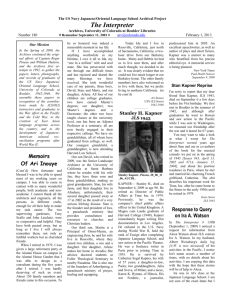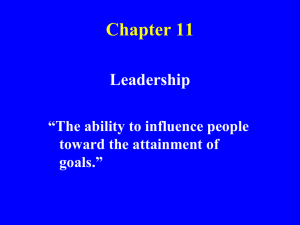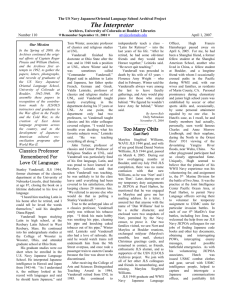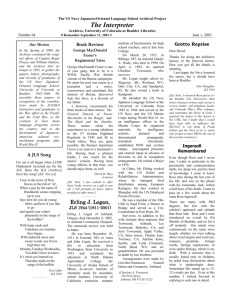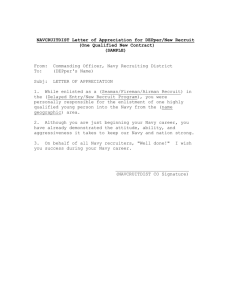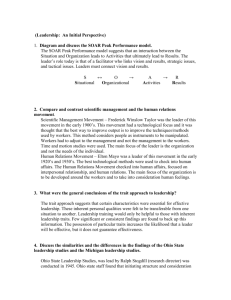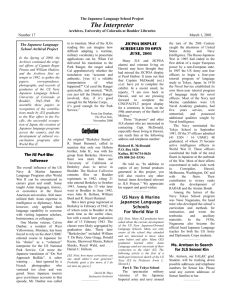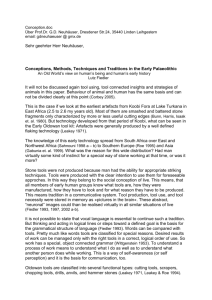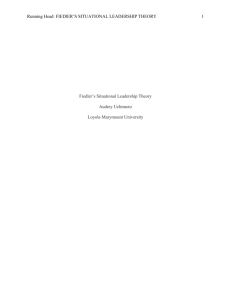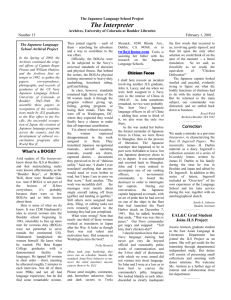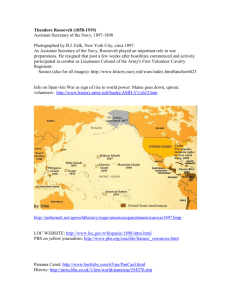The US Navy Japanese/Oriental Language School Archival Project
advertisement
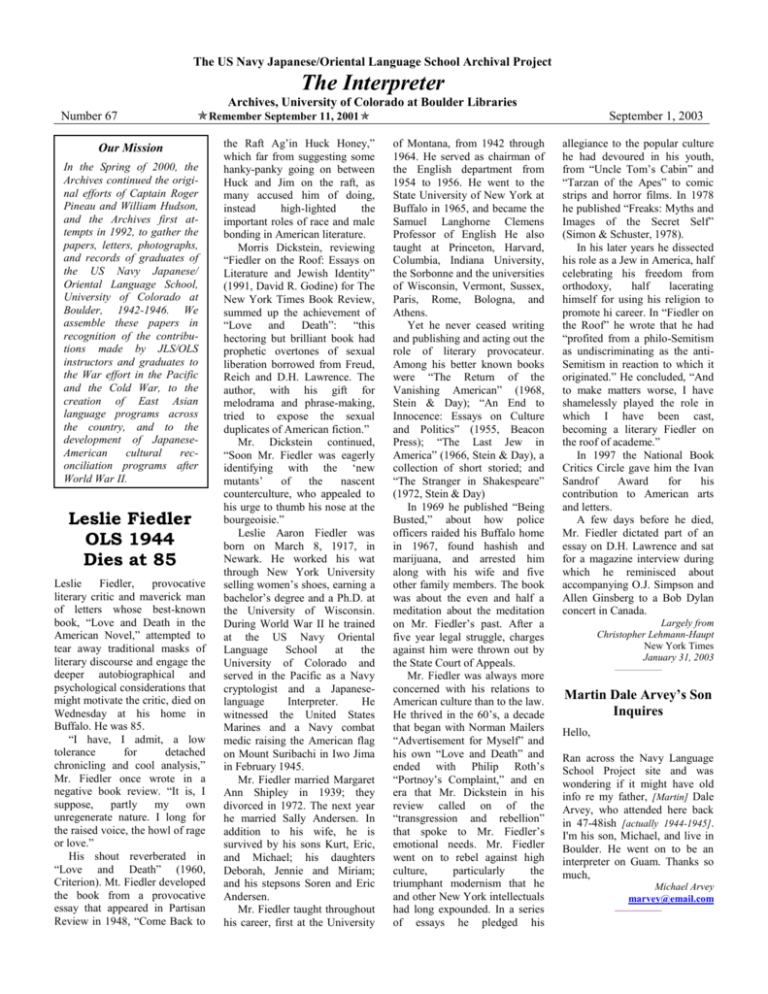
The US Navy Japanese/Oriental Language School Archival Project The Interpreter Number 67 Archives, University of Colorado at Boulder Libraries Remember September 11, 2001 Our Mission In the Spring of 2000, the Archives continued the original efforts of Captain Roger Pineau and William Hudson, and the Archives first attempts in 1992, to gather the papers, letters, photographs, and records of graduates of the US Navy Japanese/ Oriental Language School, University of Colorado at Boulder, 1942-1946. We assemble these papers in recognition of the contributions made by JLS/OLS instructors and graduates to the War effort in the Pacific and the Cold War, to the creation of East Asian language programs across the country, and to the development of JapaneseAmerican cultural reconciliation programs after World War II. Leslie Fiedler OLS 1944 Dies at 85 Leslie Fiedler, provocative literary critic and maverick man of letters whose best-known book, “Love and Death in the American Novel,” attempted to tear away traditional masks of literary discourse and engage the deeper autobiographical and psychological considerations that might motivate the critic, died on Wednesday at his home in Buffalo. He was 85. “I have, I admit, a low tolerance for detached chronicling and cool analysis,” Mr. Fiedler once wrote in a negative book review. “It is, I suppose, partly my own unregenerate nature. I long for the raised voice, the howl of rage or love.” His shout reverberated in “Love and Death” (1960, Criterion). Mt. Fiedler developed the book from a provocative essay that appeared in Partisan Review in 1948, “Come Back to the Raft Ag’in Huck Honey,” which far from suggesting some hanky-panky going on between Huck and Jim on the raft, as many accused him of doing, instead high-lighted the important roles of race and male bonding in American literature. Morris Dickstein, reviewing “Fiedler on the Roof: Essays on Literature and Jewish Identity” (1991, David R. Godine) for The New York Times Book Review, summed up the achievement of “Love and Death”: “this hectoring but brilliant book had prophetic overtones of sexual liberation borrowed from Freud, Reich and D.H. Lawrence. The author, with his gift for melodrama and phrase-making, tried to expose the sexual duplicates of American fiction.” Mr. Dickstein continued, “Soon Mr. Fiedler was eagerly identifying with the ‘new mutants’ of the nascent counterculture, who appealed to his urge to thumb his nose at the bourgeoisie.” Leslie Aaron Fiedler was born on March 8, 1917, in Newark. He worked his wat through New York University selling women’s shoes, earning a bachelor’s degree and a Ph.D. at the University of Wisconsin. During World War II he trained at the US Navy Oriental Language School at the University of Colorado and served in the Pacific as a Navy cryptologist and a Japaneselanguage Interpreter. He witnessed the United States Marines and a Navy combat medic raising the American flag on Mount Suribachi in Iwo Jima in February 1945. Mr. Fiedler married Margaret Ann Shipley in 1939; they divorced in 1972. The next year he married Sally Andersen. In addition to his wife, he is survived by his sons Kurt, Eric, and Michael; his daughters Deborah, Jennie and Miriam; and his stepsons Soren and Eric Andersen. Mr. Fiedler taught throughout his career, first at the University of Montana, from 1942 through 1964. He served as chairman of the English department from 1954 to 1956. He went to the State University of New York at Buffalo in 1965, and became the Samuel Langhorne Clemens Professor of English He also taught at Princeton, Harvard, Columbia, Indiana University, the Sorbonne and the universities of Wisconsin, Vermont, Sussex, Paris, Rome, Bologna, and Athens. Yet he never ceased writing and publishing and acting out the role of literary provocateur. Among his better known books were “The Return of the Vanishing American” (1968, Stein & Day); “An End to Innocence: Essays on Culture and Politics” (1955, Beacon Press); “The Last Jew in America” (1966, Stein & Day), a collection of short storied; and “The Stranger in Shakespeare” (1972, Stein & Day) In 1969 he published “Being Busted,” about how police officers raided his Buffalo home in 1967, found hashish and marijuana, and arrested him along with his wife and five other family members. The book was about the even and half a meditation about the meditation on Mr. Fiedler’s past. After a five year legal struggle, charges against him were thrown out by the State Court of Appeals. Mr. Fiedler was always more concerned with his relations to American culture than to the law. He thrived in the 60’s, a decade that began with Norman Mailers “Advertisement for Myself” and his own “Love and Death” and ended with Philip Roth’s “Portnoy’s Complaint,” and en era that Mr. Dickstein in his review called on of the “transgression and rebellion” that spoke to Mr. Fiedler’s emotional needs. Mr. Fiedler went on to rebel against high culture, particularly the triumphant modernism that he and other New York intellectuals had long expounded. In a series of essays he pledged his September 1, 2003 allegiance to the popular culture he had devoured in his youth, from “Uncle Tom’s Cabin” and “Tarzan of the Apes” to comic strips and horror films. In 1978 he published “Freaks: Myths and Images of the Secret Self” (Simon & Schuster, 1978). In his later years he dissected his role as a Jew in America, half celebrating his freedom from orthodoxy, half lacerating himself for using his religion to promote hi career. In “Fiedler on the Roof” he wrote that he had “profited from a philo-Semitism as undiscriminating as the antiSemitism in reaction to which it originated.” He concluded, “And to make matters worse, I have shamelessly played the role in which I have been cast, becoming a literary Fiedler on the roof of academe.” In 1997 the National Book Critics Circle gave him the Ivan Sandrof Award for his contribution to American arts and letters. A few days before he died, Mr. Fiedler dictated part of an essay on D.H. Lawrence and sat for a magazine interview during which he reminisced about accompanying O.J. Simpson and Allen Ginsberg to a Bob Dylan concert in Canada. Largely from Christopher Lehmann-Haupt New York Times January 31, 2003 _______________ Martin Dale Arvey’s Son Inquires Hello, Ran across the Navy Language School Project site and was wondering if it might have old info re my father, [Martin] Dale Arvey, who attended here back in 47-48ish [actually 1944-1945]. I'm his son, Michael, and live in Boulder. He went on to be an interpreter on Guam. Thanks so much, Michael Arvey marvey@email.com _______________ The Strange JLS Career of William Massar I’m uncertain as to which JLS class claims me as a member. I first reported at Boulder as a Yeoman 3/c on December 31, 1942 and was scheduled to graduate in the latter part of 1943. Unfortunately, for a reason never disclosed to me, I was in the group of thirty or more who, instead of being commissioned as Ensigns, were discharged from the Navy “for the convenience of the government” commissioned. Some withdrew and reentered. Some withdrew and never came back. The list we put together for Professors Slesnick and Dingman from the transcripts remains somewhat problematic, but it was the best we could do. William Massar’s new address is 1550 Beacon St., Apt. 14F, Brookline, MA 02446. He is looking for William August Klare, a JLS graduate, but not one of our contacts. Does anyone have an address for him? William Massar was also among CU Law Professor Ben Galland’s correspondents. We have Ben Galland’s war letters. We thank Mr. Massar for his letter.] _______________ in July of 1943. However, the Navy reversed course for me. It contracted with me to return to Boulder, as a civilian, in January of 1944, commissioned me an Ensign in March, and I was graduated from Boulder in December of 1944. The Navy never informed me as to why it permitted me to return to Boulder. Captain Roger Pineau, with whom I had some correspondence and telephone discussions while he was working on his contemplated book on the JLS and its graduates, was particularly curious about how I managed to return to Boulder and led me to believe that I was the only one who did. As I told him, it was no easy task. Stillwater Grads closest name among the OK A&M grads]. He was a very learner and clearly at the top of the class. He was in my immediate class (about five students) and quickly demonstrated a grasp not only of speaking but also writing and reading Japanese. He, indeed, soon became a Meijin. I recently came across the original certificate of completion that I received from the naval training school (Oriental Languages) at what was then called the Oklahoma Agricultural and Mechanical College, Stillwater, OK. It is dated June 22nd, 1946 and was signed by James A. McAlpine, Director, and J.H. Morrill, US Navy, Commanding. To my best recollection, the most facile Japanese linguist in the graduating class was one Ensign (?) FNU Woodward [Ed. Note: FNU ~ First Name Unknown. We suspect this to be Stanley Woodward, the William (Bill) Massar JLS 1943-1944 [Ed. Note: Stuart Prestrud told of a near graduation purge in the Spring of 1944 (see Interpreter #30). But he was not called back. Perhaps Mr. Massar was called back precisely because of this 1944 purge. Due to the loss of the entire office files of the JLS, Scott Shaver and I had to painstakingly reconstruct “graduation” records from transcripts in the CU Admissions William S. Bavis OLS 1946 [Ed. Note: We like to print as many Stillwater letters, as possible, to include the experiences of the later classes. I am going through the files to find such letters. I hope we can find Mr. Woodward.] _______________ Office files. Yes, all of you have CU credit and are alumni of CU whether you wanted to be or not. These files show William Massar as being listed with his 1943 fellows. But, according to our interpretation of the transcripts, he was not the only one recalled. Linker, Ramsdell and Wiles likewise were listed as Withdrawn and Reentered, the last of these is one of our readers. Perhaps Mr. Wiles would like to compare notes? I wish we could provide more information, but the transcript notations are rather cryptic and not easy to interpret. Some were listed as commissioned, some not commissioned at CU, but obviously graduated, others withdrew but were Book Review Back by the solitary request of Glenn Nelson, the Book Review follows. Two books I sent to my father, that he liked, were Norman MacLean, A River Runs Through It and Ivan Doig, English Creek. Both authors discuss Montana and growing up “before history” when people still rode horses and crafted with their hands. Both describe relations between fathers and sons. Both stories are told by consummate taletellers. Would that there were more writers like these. _______________
